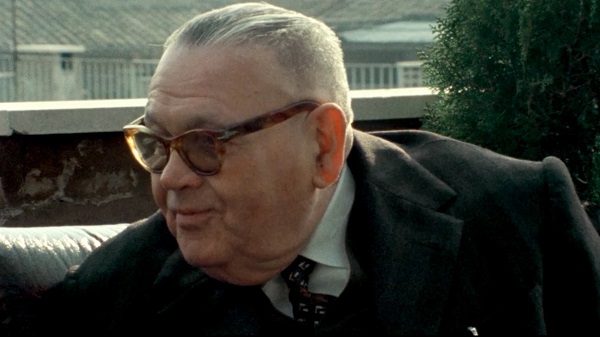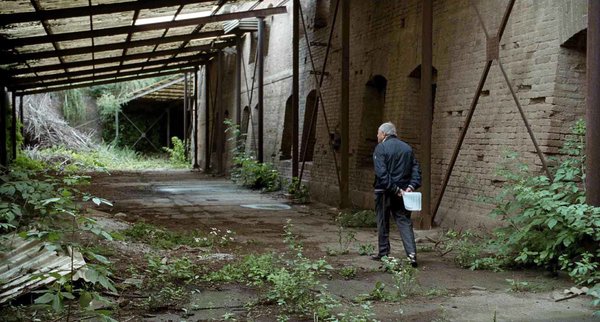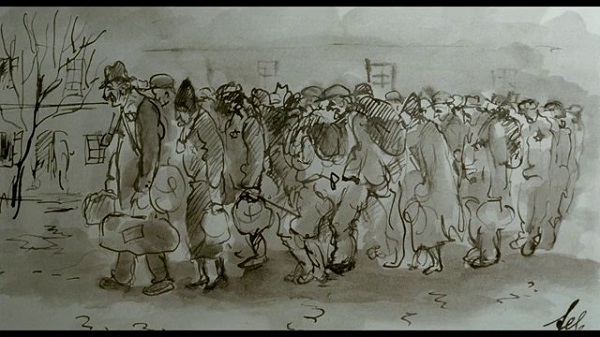The Last of the Unjust Review
"A haunting and comprehensive documentary"
Claude Lanzmann's
Shoah is a renounced documentary about the Holocaust earning plenty of critical and audience praise. When he was filming the documentary, he interviewed Benjamin Murmelstein, the only Elder Jew to survive the Holocaust, but did not use the footage in the original documentary. The French documentary-maker has gone back to the footage to make a documentary about Murmelstein's story as well as taking a wider look into the Holocaust.
Benjamin Murmelstein is a controversial figure, a senior Jewish Elder in Austria who was accused of being a Nazi collaborator after working with the Jewish Emigration Office and ran Thersienstadt, a camp that was designed to be a "model ghetto". Murmelstein ends up in exile in Rome, where Lanzmann interviews him in the 70s and Lanzmann himself visits sites in Austria, Poland and the Czech Republic.
 The Last of the Unjust
The Last of the Unjust is a long documentary, scanning a running time of three and half hours. Lanzmann is comprehensive with his look of the Holocaust; he delves into Murmelstein's personal experience, the wider issue of the Holocaust and how the two overlapped. The documentary focuses on events from 1938 after Austria was annexed by Germany to the end of the war with brief looks at Adolf Eichmann's trial.
Many aspects of the Holocaust are looked at during the documentary: the economic pressures put on the Jewish population, Kristallnacht in Vienna, the Madagascar Plan, the start of the Final Solution and the running of Thersienstadt. Murmelstein was present for many of these events, having worked for Eichmann when controlling Jewish Emigration, which caused the dilemma of many Jewish people wanting to leave the Nazi regime, but the Nazis financially penalized the Jewish population, which made sure many Jewish people could not afford to flee the regime.

Murmelstein is frank during the interviews with Lanzmann. It is clear that Murmelstein was a smart man; using his knowledge of mythology as metaphors for his situation. He answers the tough questions like why did he not leave central Europe when he had the opportunity to go to Britain, America or Palestine. But the interview does turn fiery when Murmelstein talks about his role at being an Elder Jew in Thersienstadt, being the deputy leader and being prepared to be used as a propaganda tool, believing it was the best way to ensure survivor for himself and the inmates.
The interviews with Murmelstein took place in 1975; he died in 1989, so Lanzmann fills the documentary with himself speaking to the camera to give historical information. He also reads extracts from books and documentaries and visits many towns and cities - Terezin, Vienna, Prague, Zarzecze and Krakow, even if some of the visits are very brief. There is a potency when Lanzmann visits old concentration camps that have been left for nature to reclaim with the filmmaker talking in a somber tone. There are moments like tourists who visit the Path of Remembrance in Vienna, showing memorials for victims of the Holocaust and a Rabbi singing a prayer. There are many long, lingering shots and slow camera movements to help emphasize these moments.

As well as visiting the ruins of concentration camps and important Jewish sites
, there is an emphasis that many people living near them continue to have normal, quiet lives. The town of Bohušovice in the Czech Republic is a commuter town, the same tracks that were used to transport Holocaust victims to Thersienstadt is now used for passenger and freight trains. Towns like Terezin, Zarzezce and Nisko are places that continue to have people living there. People go to school, work or bars and children play in these areas.
The bulk of the movie is made up with the interviews with Murmelstein and the visits to sites, yet Lanzmann occasionally shows historical photographs, drawings from Holocaust victims and a brief showing of a Nazi propaganda film about the camp, giving a brief look at the camp, even if it's a very skewed one.
The Last of the Unjust is a compelling documentary about the Holocaust and the unique story about one man's experience during it exploring lesser known events of the Holocaust like the Madagascar Plan and the Colombia scheme. History enthusiasts will certainly find the movie interesting.
Pros
- The historical detail of events big and small
- The frank interview between Lanzmann and Murmelstein
- The lingering shots in the present
Cons
- The long text crawl at the beginning
 The Last of the Unjust is a long documentary, scanning a running time of three and half hours. Lanzmann is comprehensive with his look of the Holocaust; he delves into Murmelstein's personal experience, the wider issue of the Holocaust and how the two overlapped. The documentary focuses on events from 1938 after Austria was annexed by Germany to the end of the war with brief looks at Adolf Eichmann's trial.
Many aspects of the Holocaust are looked at during the documentary: the economic pressures put on the Jewish population, Kristallnacht in Vienna, the Madagascar Plan, the start of the Final Solution and the running of Thersienstadt. Murmelstein was present for many of these events, having worked for Eichmann when controlling Jewish Emigration, which caused the dilemma of many Jewish people wanting to leave the Nazi regime, but the Nazis financially penalized the Jewish population, which made sure many Jewish people could not afford to flee the regime.
The Last of the Unjust is a long documentary, scanning a running time of three and half hours. Lanzmann is comprehensive with his look of the Holocaust; he delves into Murmelstein's personal experience, the wider issue of the Holocaust and how the two overlapped. The documentary focuses on events from 1938 after Austria was annexed by Germany to the end of the war with brief looks at Adolf Eichmann's trial.
Many aspects of the Holocaust are looked at during the documentary: the economic pressures put on the Jewish population, Kristallnacht in Vienna, the Madagascar Plan, the start of the Final Solution and the running of Thersienstadt. Murmelstein was present for many of these events, having worked for Eichmann when controlling Jewish Emigration, which caused the dilemma of many Jewish people wanting to leave the Nazi regime, but the Nazis financially penalized the Jewish population, which made sure many Jewish people could not afford to flee the regime.
 Murmelstein is frank during the interviews with Lanzmann. It is clear that Murmelstein was a smart man; using his knowledge of mythology as metaphors for his situation. He answers the tough questions like why did he not leave central Europe when he had the opportunity to go to Britain, America or Palestine. But the interview does turn fiery when Murmelstein talks about his role at being an Elder Jew in Thersienstadt, being the deputy leader and being prepared to be used as a propaganda tool, believing it was the best way to ensure survivor for himself and the inmates.
The interviews with Murmelstein took place in 1975; he died in 1989, so Lanzmann fills the documentary with himself speaking to the camera to give historical information. He also reads extracts from books and documentaries and visits many towns and cities - Terezin, Vienna, Prague, Zarzecze and Krakow, even if some of the visits are very brief. There is a potency when Lanzmann visits old concentration camps that have been left for nature to reclaim with the filmmaker talking in a somber tone. There are moments like tourists who visit the Path of Remembrance in Vienna, showing memorials for victims of the Holocaust and a Rabbi singing a prayer. There are many long, lingering shots and slow camera movements to help emphasize these moments.
Murmelstein is frank during the interviews with Lanzmann. It is clear that Murmelstein was a smart man; using his knowledge of mythology as metaphors for his situation. He answers the tough questions like why did he not leave central Europe when he had the opportunity to go to Britain, America or Palestine. But the interview does turn fiery when Murmelstein talks about his role at being an Elder Jew in Thersienstadt, being the deputy leader and being prepared to be used as a propaganda tool, believing it was the best way to ensure survivor for himself and the inmates.
The interviews with Murmelstein took place in 1975; he died in 1989, so Lanzmann fills the documentary with himself speaking to the camera to give historical information. He also reads extracts from books and documentaries and visits many towns and cities - Terezin, Vienna, Prague, Zarzecze and Krakow, even if some of the visits are very brief. There is a potency when Lanzmann visits old concentration camps that have been left for nature to reclaim with the filmmaker talking in a somber tone. There are moments like tourists who visit the Path of Remembrance in Vienna, showing memorials for victims of the Holocaust and a Rabbi singing a prayer. There are many long, lingering shots and slow camera movements to help emphasize these moments.
 As well as visiting the ruins of concentration camps and important Jewish sites, there is an emphasis that many people living near them continue to have normal, quiet lives. The town of Bohušovice in the Czech Republic is a commuter town, the same tracks that were used to transport Holocaust victims to Thersienstadt is now used for passenger and freight trains. Towns like Terezin, Zarzezce and Nisko are places that continue to have people living there. People go to school, work or bars and children play in these areas.
The bulk of the movie is made up with the interviews with Murmelstein and the visits to sites, yet Lanzmann occasionally shows historical photographs, drawings from Holocaust victims and a brief showing of a Nazi propaganda film about the camp, giving a brief look at the camp, even if it's a very skewed one.
The Last of the Unjust is a compelling documentary about the Holocaust and the unique story about one man's experience during it exploring lesser known events of the Holocaust like the Madagascar Plan and the Colombia scheme. History enthusiasts will certainly find the movie interesting.
As well as visiting the ruins of concentration camps and important Jewish sites, there is an emphasis that many people living near them continue to have normal, quiet lives. The town of Bohušovice in the Czech Republic is a commuter town, the same tracks that were used to transport Holocaust victims to Thersienstadt is now used for passenger and freight trains. Towns like Terezin, Zarzezce and Nisko are places that continue to have people living there. People go to school, work or bars and children play in these areas.
The bulk of the movie is made up with the interviews with Murmelstein and the visits to sites, yet Lanzmann occasionally shows historical photographs, drawings from Holocaust victims and a brief showing of a Nazi propaganda film about the camp, giving a brief look at the camp, even if it's a very skewed one.
The Last of the Unjust is a compelling documentary about the Holocaust and the unique story about one man's experience during it exploring lesser known events of the Holocaust like the Madagascar Plan and the Colombia scheme. History enthusiasts will certainly find the movie interesting.